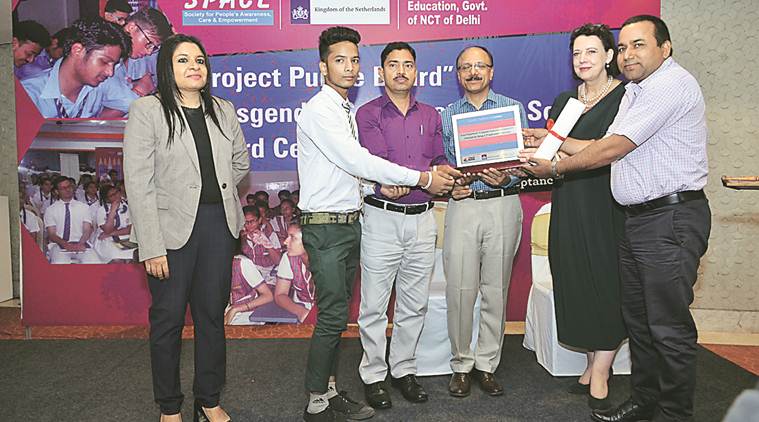
Over Eight months after the heads of schools in the capital were first introduced to transgender identity and rights and sensitised on the needs of transgender students, 27 schools — including 25 government schools — have now been certified “trans-friendly”.
An awards ceremony marked this small milestone in a pilot project called ‘Purple Board’, aimed at making education accessible for transgender and gender non-conforming children, by addressing transphobia and identifying and eliminating trans-bullying. An award modelled on the flag representing the transgender community — with blue, pink and white horizontal stripes — were testimony to the baby steps taken by the schools towards trans-inclusivity.
The project was initiated by NGO Society for People’s Awareness Care and Empowerment (SPACE) in collaboration with the Delhi government’s Directorate of Education, with support from the Netherlands Embassy.
In October, the heads of schools had attended a workshop with the NGO, followed by workshops with nodal teachers. This was eventually extended to one-on-one interactions with students of classes IX-XII in over 4-5 workshops per school.
These workshops included sessions wherein SPACE transgender members sensitised students on the meaning of transgender and the ways in which school could be a difficult place for them.
According to Anjan Joshi, director of the organisation, the most revelatory activity was the “anonymous question box”.
“We would ask the teacher to step out during the session and the children would slide into a box the questions they didn’t wish to ask in open. ‘Do transpeople have children?’ was one such question. Many children came out as trans in their anonymous messages. In the beginning, many school principals did not welcome the idea of conducting these workshops saying their schools do not have any trans-students. But there was not a single school in which a child didn’t come out to us as trans,” Joshi said.
On whether there was any resistance to the workshops by students, he said, “None at all. However, there were three other private schools whose allowed only the first workshop. They did not like the idea of interacting with children and dropped out of the project.”
Salma, a class XII student of a Government Girls Senior Secondary School which has been certified transfriendly, said:
“When I saw transgender people, I wondered how they behaved differently. I later realised that they are just like us, and that they are merely expressing what they feel. Their feelings are different from the bodies they were born into. They should be able to study in the same schools as the rest of us and and feel secure,” she said.
Almost every principal present at the ceremony admitted they did not know what “transgender” meant before the workshops happened.
There are material steps which the schools have been urged to take — creating at least one unisex or gender neutral washroom in the school, putting up a chart on the school noticeboard stating that it is an “anti-transbullying school”, and setting up an anti-transbullying committee.